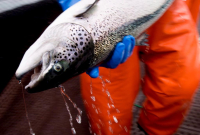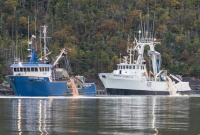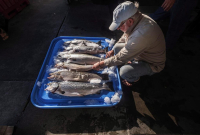Support strong Canadian climate journalism for 2025
More than a month after a mass salmon die-off was reported in southern Newfoundland fish pens, the company says the death toll rings in at an estimated 2.6 million — just under half of all its fish.
The Norwegian-owned Northern Harvest Sea Farms made the announcement Friday, after the provincial government announced it was suspending licences at the 10 sites where the fish died.
Fisheries and Land Resources Minister Gerry Byrne said he learned Friday that the number of dead fish was higher the company initially reported, prompting him to suspend the licences.
He said he's also requested a meeting with the international president of Mowi, which owns the company.
Images of the messy cleanup process show debris from dead fish dumped into the ocean, sparking environmental concerns and rekindling discussions about regulation and oversight in Newfoundland and Labrador's growing aquaculture industry.
"I want to reassure the people whose livelihoods depend on the aquaculture sector that we continue to focus on solutions that strengthen policies and practices to ensure public transparency is ever-present," Byrne's statement read.
Jamie Gaskill, the managing director of Northern Harvest Sea Farms Newfoundland, said the company is focusing on cleaning up its pens, with work expected to wrap up by the end of next week.
Sixty-three of 72 affected sea cages have been cleaned up, according to Gaskill, out of the company's 166 total cages.
The company said two million fish died from a prolonged period of high water temperatures that it reported to the government on Sept. 3, though the incident was not disclosed publicly until weeks later.
The company attributes the deaths to a lack of oxygen as the fish clustered together while seeking relief from the warmer-than-usual water temperatures.
Another estimated 600,000 fish that may have been "weakened by the temperature event" died later, Gaskill said.
Northern Harvest notified the Newfoundland and Labrador government of these additional deaths on Friday, prompting the cancellation of licences over what minister Byrne referred to as "evidence of non-compliance."
"I take responsibility for this personally as the Managing Director of the company," Gaskill's statement said. "We were too focused on clean up efforts, and we have learned from this experience."
Northern Harvest estimates approximately 5,000 tonnes of salmon will be removed from the cages, with the average dead fish weighing two kilograms.
"This means on average, they were not market sized fish," Gaskill's statement read.
Hundreds of workers have been involved in the cleanup, according to Gaskill, including Northern Harvest staff, service providers and contracted divers and vessel crews.
The cleanup so far has been subject to public scrunity, heightened after stop work order was issued on diving operations at Northern Harvest's Harbour Breton site following an "incident" involving a contracted diver last weekend.
To address environmental concerns, Northern Harvest said it has asked MAMKA, a marine management partnership between Qalipu First Nation Band and Miawpukek First Nation, to monitor environmental effects.
Northern Harvest said it will not influence MAMKA's findings, which will be reported publicly. It said the environmental monitoring plan is being developed with input from Environment and Climate Change Canada, Canadian Wildlife Services and the Department of Fisheries and Oceans, among other agencies.
The fish farm saga has prompted criticism from the provincial Liberals' political opponents, as Byrne, the fisheries minister who has championed the role of aquaculture in the province's economic growth, promises industry workers that "we will overcome our present adversity."
On Thursday, Byrne announced an independent review of the mass mortality incident to be conducted by Memorial University of Newfoundland's Marine Institute.
NDP legislator Jim Dinn criticized the move, arguing the Marine Institute, which is listed as a partner in the Liberals' aquaculture growth plan, is too connected to the sector to be considered truly independent.
"The minister is not demonstrating the leadership required to handle this debacle," Dinn said in a statement. "It's critical that the premier step in, take action, and restore public trust in government's ability to protect the marine environment and regulate a sustainable aquaculture industry."
Dinn had previously asked for an investigation to be carried out by Environment and Climate Change Canada, or an environmental consulting firm paid for by the company.
Progressive Conservative Ches Crosbie, leader of the official Opposition, has also criticized the Liberals for what he described as slow disclosure of information around the incident.
Environmentalists consider open net farming, the model used by Northern Harvest, to be a risky aquaculture method because of the free exchange between the outer environment and the farm, arguing that it increases risk of contamination from waste, disease and potential fish escapes.
The federal Liberal Party targeted open-net salmon fishing in British Columbia in their election platform, saying it would develop a plan to move the western province over to closed containment by 2025 if re-elected. The party didn't mention anything about the practice in Atlantic Canada.
This report by The Canadian Press was first published Oct. 12, 2019.





Comments